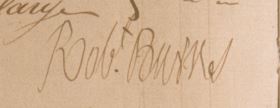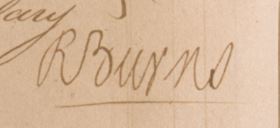Robert Burns (1759-1796)
Robert Burns (1759-1796)
Poet
Robert Burns is Scotland’s best known poet. He was a tenant farmer in Ayrshire who came to prominence through the publication of his poems in the 1780s. His intention had been to raise money from his poems in order to emigrate to Jamaica, but the positive reaction to this work, especially in Edinburgh, persuaded him to change his plans. He left Ayrshire to spend the winters of 1786-7 and 1787-8 in Edinburgh and also embarked upon several tours around Scotland, absorbing the local cultures of folklore and song. He resettled into farm life at Ellisland, Dumfriesshire with Jean Armour, whom he married in 1788, but in 1792 obtained work as an excise officer at Dumfries, where he spent the last five years of his life. Learn more in our open book blog Robert Burns (1759-1796) - the Poet.
Robert Burns is one of the famous Scots commemorated in our Archivists' Garden with references to his poems in the entries for bluebell, cowslip, primrose, dog rose and rowan.
Birth and baptism
The birth of Robert Burns on 25 January 1759 and his baptism the next day are recorded in the Old Parish Register for Ayr. The future poet was the eldest of seven children of William Burnes, a gardener and tenant farmer, and his wife, Agnes Brown. In 1756 William met Agnes at the fair in the parish of Maybole, where she lived, and they married in December 1757.

Birth and baptism entry for Robert Burns (15 KB jpeg)
National Records of Scotland, OPR 578/4, page 17
Transcription of entry
Robert Burns son law: to William Burns in Alloway & Agnes
Brown his spouse was born Janry 25th 1759 bapt: 26th
By Mr Wm Dalrymple witnesses John Tennant & Jas Young
Expanded transcription of entry
Robert Burns son lawful to William Burns in Alloway and Agnes
Brown his spouse was born January 25th 1759 baptised 26th
By Mr William Dalrymple witnesses John Tennant and James Young
Mauchline kirk session
Robert Burns appeared before the kirk session of Mauchline in 1786 to admit that he was the father of Jean Armour’s twin children, and underwent public repentance during June to August (CH2/896/12 pages 162-173).
Extracts from Mauchline kirk session minutes (251 KB pdf)
In 1788 it came to the attention of the kirk session that Burns and Jean Armour had been irregularly married, ie in a civil ceremony and not by a minister. As was usual in such cases, the session summoned them and rebuked them on 5 August, impressing on them that they were bound together as husband and wife (OPR604/2 p235)
Transcription and image of the irregular marriage entry of Robert Burns, 1788 (137 KB pdf)
Robert Burns, poet
Burns dedicated many of his works to friends. These poems included ‘The Highland Lassie O’ and ‘Highland Mary’ dedicated to Mary Campbell whom he met in Tarbolton and fell in love with, and ‘Ae Fond Kiss’ dedicated to Agnes Maclehose who exchanged letters with him as ‘Clarinda’ to his ‘Sylvander’.
The manuscripts of Burns’ works are held in the National Library of Scotland and other archives, but not in the NRS.
Robert Burns, Exciseman
Details of Burns’ short career as an Exciseman can be gleaned from Exchequer excise salary books (E562/6), Customs and Excise records (CE6/9 and RH1/2/881) and a letter in the Mar and Kellie collection (GD124/15) in which the poet explained his near-dismissal from the Excise service and his independence of mind. In addition, a letter survives that records the poet’s visit to the Excise Office in Dumfries. It gives a vivid glimpse of his state of mind one week before the died: ‘reduced & shattered as he was, in the extreme, his wit and humour remained.’ (GD151/11/26/46). It proves that Burns made a return journey to Dumfries to collect his salary, an arduous undertaking unrecorded in accounts of his life.
Burns' signatures from the Excise salary book, 6 April, 7 June and 8 July 1796 reflect his declining strength, E562/6/89/1, page 49 (12 KB jpegs)



Testament of Robert Burns
The Old Parish Register recording Burns’ death in 1796 has not survived. A testament for Burns appears in Dumfries Commissary Court records (CC5/6/18 pages 74-75). This is not a will, in the popular sense, but a ‘testament dative’ whereby his widow had recourse to the commissary court to recover two outstanding debts owing to her husband for which she required legal authority.
Unfortunately the testament reveals little about Robert Burns, the man. He had not made a will before he died so we do not know how he wished his possessions to be disposed of after his death. His widow, Jean, was presumably able to sort out most of his affairs without recourse to the commissary court. It was only her recovery of the two outstanding debts owing to her husband for which she required legal authority. The sole purpose of this testament was to confirm Jean as her late husband's executor, thereby enabling her to recover the debts, one of which was due from the publisher George Thomson.
View transcript (12 KB PDF)
The images of the original document are in jpeg format (approximately 330 KB):
View page 1 of the actual document
View page 2 of the actual document
Trust settlement in Court of Session records
Of rather more interest than Robert Burns’ testament is the ‘State of Gilbert Burns’s Acceptance of Mr Burns’ Estate’ (CS97/101/15). Gilbert was Robert’s brother. The account covers the period from December 1793 to May 1798, with copy correspondence to October 1800. The trustees of Robert Burns’ family devised a scheme for the support of his surviving children, Robert, Francis-Wallace, William-Nicol and James Burns. The scheme was to publish a four volume edition of Burns’ complete works – ‘well known as the Ayrshire poet’ – including posthumous poems, and a biography by Dr James Currie of Liverpool. Subscriptions were raised to meet the initial cost of publication by Thomas Cadell and William Davies in London and William Creech, bookseller in Edinburgh.
The money raised by publication was to be used for the support of the children and their mother, Jean Armour, Robert Burns’ widow. The factor overseeing the arrangements for their upkeep was William Thomson of Moat, writer in Dumfries. The accounts include an annuity payable to Robert and Gilbert’s mother, a year’s bed, board and washing for Elizabeth Burns, Robert’s natural daughter by Elizabeth Paton, cash given to Mrs Burns while in Mauchline towards the expenses of her daughter’s funeral and some of the expenses of Robert’s own funeral.
Find out more about records that are available through ScotlandsPeople. For the wide range of other records available in the National Records of Scotland see our guides.